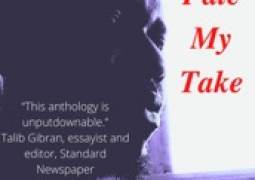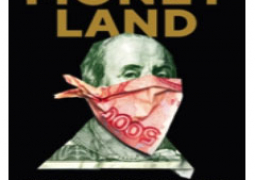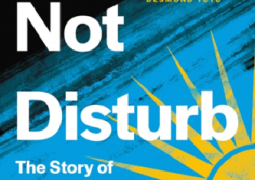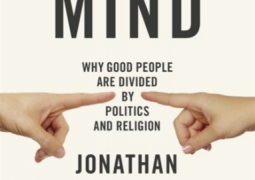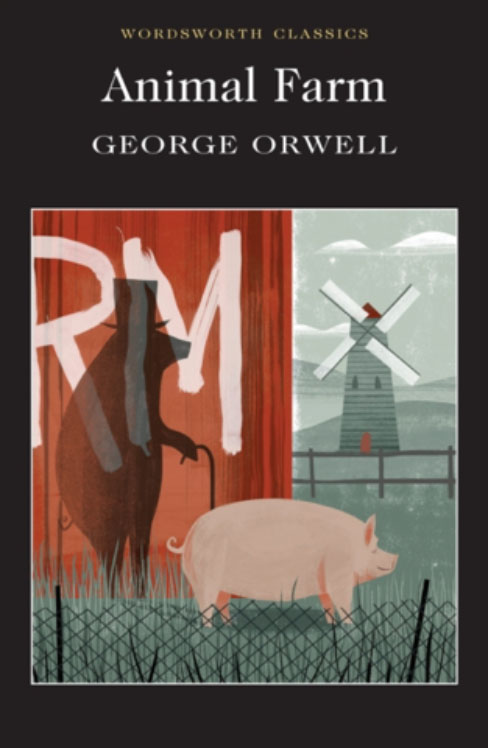
Gorge Orwell is a critically acclaimed author. Born in a time of social elitism in England, Eric Blair –penname George Orwell- was a socialist[1] who was against the imperialist ideals of the moment. Despite being a socialist, Orwell was not enamored by the communist ideals instilled in Soviet Russia, instead he considered it a totalitarian system and opposed strongly to it. His intellectual background gives way to his two best novels to this day: 1984 and Animal Farm. Orwell is used frequently and with reason whenever dystopian societies are debated over. Animal Farm is an anti-totalitarian fictional novel that exemplifies how the communist system failed in the Soviet Union.
Political systems are considered complex and perplexing. The academic understanding of them can lead to confusion, amongst other things. Animal Farm from the start does not approach its polemic topic with an academic point of view, but instead simplifies it. A whole alternative universe is created in Animal Farm in which animals are active participants of what is considered an unjust system. There is no legal jargon or complicated words. We as a reader understand what is happening because Orwell uses the most direct and simple metaphors.
The simplicity of Animal Farm is key to its brilliance. It breaks down the notion that corrupt systems are intrinsically complex and for these reasons the origins are equally inconceivable. With Orwell, that is not the case. We see from its beginnings the cycle in which the animals go through; it’s ending equally terrible as its beginning — if not more equal. However, if the reader is not well read in actual political systems they will only be left with a bad taste in their mouth. Animal Farm is a book that gently spells out what for us is obviously ‘not right’.
How is this sensation of unrighteousness acquired? Animal Farm begins with a story of injustice. Mr. Jones is the proud owner of a farm, but his treatment of the animals is questionable. He is an irresponsible man with no consideration for the animals. Driven by a dream, one of the animals starts spreading an idea that would reach beyond his death bed. Old Major was a prize-winning boar whom was tired of the ill-treatment. He spoke about a perfect utopia wherein animals were neither controlled nor oppressed by humans. It soon became a feverish dream all animals wanted to make true.
A violent revolution was executed against Mr. Jones and the animals took over the farm. It is here we can observe the metaphor of the Bolsheviks overthrowing the monarchs in Soviet Russia; in this specific case Mr. Jones is an allegory for Czar Nicholas II, the last monarch to ever rule Russia. Old Major is Marx. A man with great vision who did not live to witness the execution of his ideology. As a reader, we are ecstatic that the animals are claiming their rights and establishing a more just system for themselves.
Three key characters are introduced into the story after the downfall of Mr. Jones. Snowball, Napoleon, and Squealer. Together, they establish the basis of Animalism and its creed. The Seven Commandments were established and the animals were prompted to memorize them. An educational system was instilled, along with a centralized governing system. The pigs stayed as ‘administrators’ of the distribution of wealth produced by the animals. Animalism was successful in the beginning, all animals enjoying the new sensation of freedom. All is well until Napoleon and Snowball argue over the future of the Animal Farm.
Amongst the animals there are specific individuals that represent different political mindsets. Boxer is a horse that lives his life with the motto of “I will work harder.” He is one of the most important characters throughout the whole book, for he is the allegory for the population that believed in the system and worked for it. No matter what happened, Boxer dedicated his life to the system. Clover is the polar opposite of Boxer. Clover is a high-maintenance mare that enjoys luxuries in life. As the Animalism ideals take over the Animal Farm, Clover acts again and again against the system, all while excusing herself. She eventually runs away from the Animal Farm. Clover represents all the people that did not agree with the Communist system and wanted to flee.
The progression of the story is a morose one. Napoleon betrays Snowball and chases him away, blaming all the Animal Farm problems on him. He takes absolute control of the Animal Farm and starts manipulating the Seven Commandments. In this section of the book, we can identify Napoleon as Stalin and Snowball as Trotsky. Snowball wanted to stay as close to the Animalism creed, whereas Napoleon only searched for more political power.
The state of the Animal Farm starts becoming deplorable, and the animals turn into slaves. There is no real justice and the animals slowly start to forget what really happened in the farm. Boxer continues toiling every day, until he is too ill and is taken away into retirement. Boxer, in reality, had been sold to a slaughter house. Even when the animals realized, Squealer came rushing in. Squealer is an allegory for the media. He spouts propaganda and manipulates the truth. Even when the animals had seen what happened to Boxer, they were easily manipulated into thinking otherwise.
What makes Animal Farm so outstanding is the fact that the reader does not need to have a historical background to comprehend the main message of the idea. Because of my deep interest on Totalitarian systems, I decided to research into the metaphoric message of the story, even though its message was clear without requiring historical inquiry. The ending in itself is so exquisite, because it reflects the flaws of a system that dares to state that every single one of us are equal.
“All animals are equal, but some animals are more equal than others.”
The main message of Animalism was corrupted in order to make space for the benefit of others. This is what also happened with the Communist system in Soviet Russia — in every country it has been attempted. Orwell was able to criticize this fact by a simple novel of animals trying to find a better solution for their mishaps. What makes us any different from them? Nothing. We are also animals trying to find better solutions for our situations. It is our responsibility, however, to not create an endless circle of repeated mistakes and learn from history.
Available at Timbooktoo Tel: 4494345


